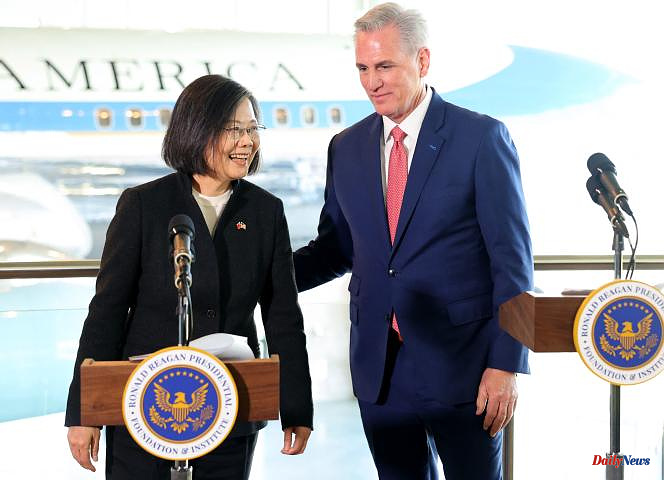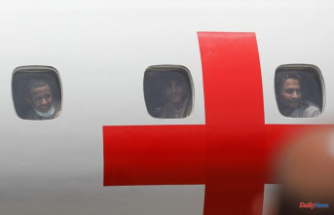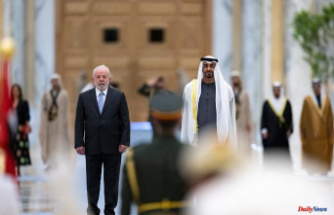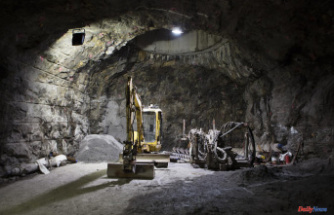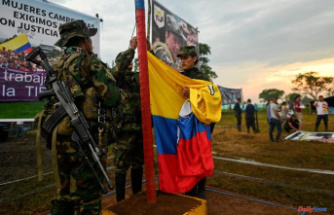Despite repeated threats of retaliation from China, Taiwanese President Tsai Ing-wen met Wednesday (April 5) in California with Speaker of the US House of Representatives, Republican Kevin McCarthy.
"We are not alone, we are not isolated", greeted the leader of Taiwan, while Kevin McCarthy, elected from California, received her, surrounded by a large group of parliamentarians, Republicans and Democrats, at the presidential library Ronald-Reagan of Simi Valley, near Los Angeles.
"Their presence and unwavering support reassures the Taiwanese people," applauded Tsai Ing-wen, from a party that traditionally campaigns for independence, an absolute red line for Beijing. Under his tenure, Taiwan grew closer to the United States.
For his part, Kevin McCarthy assured that the relationship between Taipei and Washington was "stronger" than it had ever been "in his lifetime".
"Strategic Ambiguity"
China launched unprecedented military maneuvers around Taiwan last August, when Democrat Nancy Pelosi, McCarthy's predecessor, visited Taiwan. This time, Beijing has promised to take "determined and effective measures to safeguard national sovereignty and territorial integrity," the Chinese foreign ministry said in a statement released by the Xinhua News Agency.
China considers the democratic and autonomous island of Taiwan to be one of its provinces to be taken back, favoring "peaceful reunification", but without excluding the use of force. In the name of its "one China" principle, no country is supposed to maintain official ties with Beijing and Taipei at the same time.
Only thirteen states recognize Taiwan, including Belize and Guatemala, Latin American countries that Ms. Tsai visited during her tour to cement the relationship with her few official allies, after a first stop in New York.
But the United States has a long-standing "strategic ambiguity" on the Taiwan issue. While Washington has recognized Beijing since 1979, it remains Taiwan's most powerful ally as well as its main arms supplier.
Consensus between Democrats and Republicans
Support for the island is one of the few points of consensus between Democrats and Republicans in the US Congress. A fact that Mr. McCarthy tried to recall with great symbolism in front of an old version of Ronald Reagan's Air Force One presidential plane.
"The friendship between the people of Taiwan and the United States is of great importance to the free world and is essential to maintaining economic freedom, peace and regional stability," he said.
At first, the new Speaker of the House of Representatives, who initially wanted to visit Taiwan, made no direct reference to China or its President Xi Jinping, nor did Ms. Tsai. What contrast with the frontal attitude of Ms. Pelosi when she held the position.
Kevin McCarthy, however, was more direct during a press conference after the meeting. "There is no reason [for Beijing] to take retaliatory measures," he pleaded. But "China is not going to tell me where I can go or who I can talk to," he added, not ruling out a future visit to the island.
Pursue arms sales to Taiwan
The speaker also called for "continuing arms sales to Taiwan", which he said are the "best way" to prevent a Chinese invasion of the island. "It's a key lesson we learned from Ukraine that the idea of simple sanctions in the future won't stop anyone," he insisted.
The Biden administration has also downplayed the importance of this meeting. On Wednesday, the head of the American diplomacy, Antony Blinken, stressed that it was only a "transit" of the Taiwanese leader on the American territory and not an official visit. He called on Beijing not to use the interview as an "excuse" to "escalate tensions".
Earlier this week, Chinese diplomacy, for its part, recalled that China was "firmly opposed" to the interview Mr. McCarthy and Ms. Tsai. Beijing also explained that it was ready to "firmly defend its national sovereignty and territorial integrity", without expressly mentioning possible military maneuvers.

